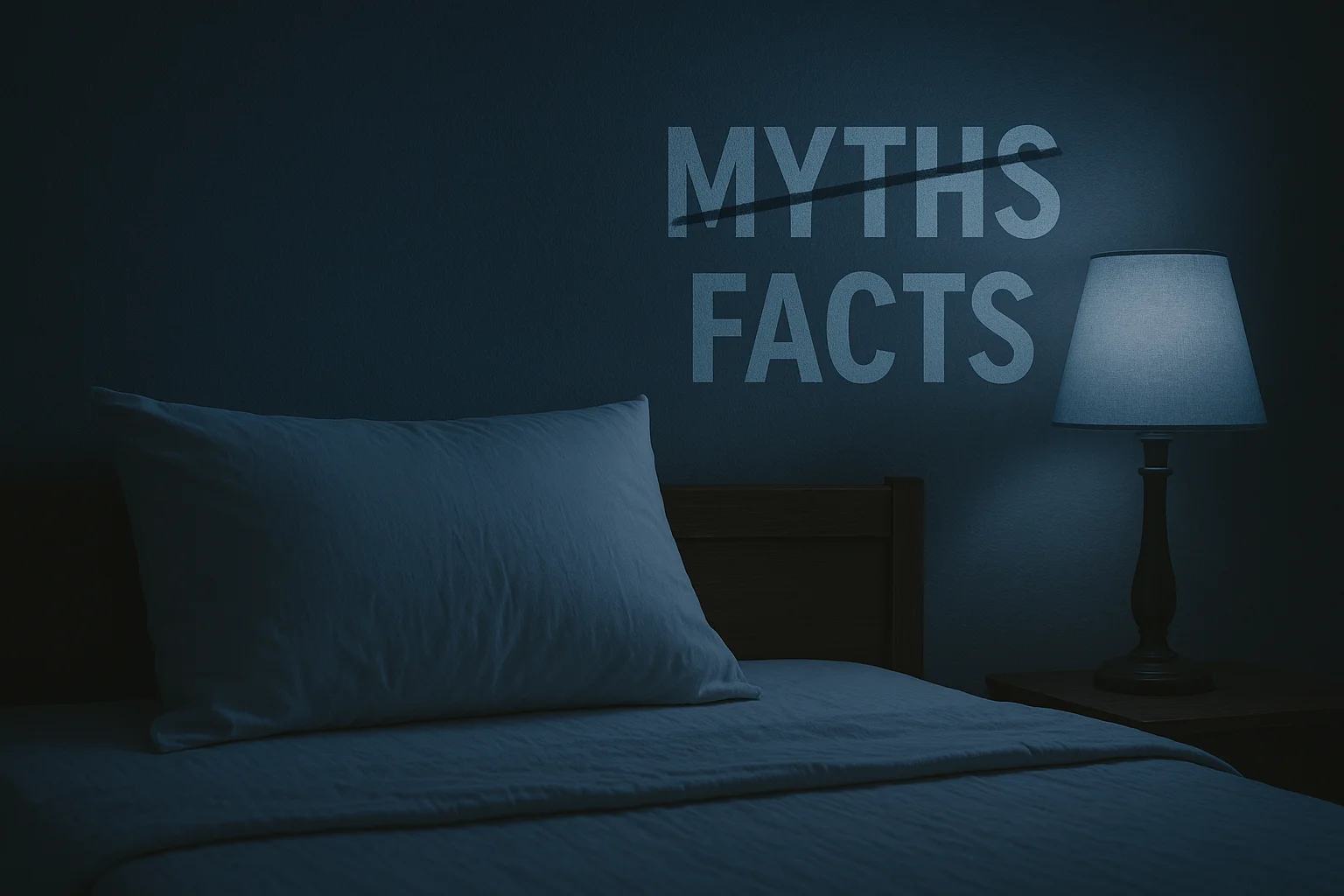Sleep Smarter: 20 Surprising Sleep Myths - Busted by Science

Think you know sleep? Let's bust 20 popular beliefs backed by global expert analysis. Debunking these myths isn't trivia - it's essential. Misleading ideas around sleep can derail your habits, damage health, and undermine wellness. A rigorous Delphi-panel of sleep and circadian experts evaluated 24 common sleep beliefs - and confirmed 20 as myths due to weak or contradictory evidence.
By clearing the clutter of misinformation, you gain clarity - should your bedtime routine change? How much sleep is truly enough? And why sleep matters for your overall health and longevity.
How Experts Found the Truth - The Delphi Method
Experts from sleep medicine, neuroscience and circadian biology used the Delphi method - a structured, multi-round process of surveys, debates, and iterative refinement - to rate each statement's accuracy and public-health importance (Greatist, PubMed).
- Initial list: 24 widely shared sleep beliefs found in popular media and scientific commentary.
- Goal: Identify myths - defined as statements inconsistent with robust scientific evidence.
- Process: Three phases of expert input - focus groups, feedback rounds, and closed surveys using 5‑point Likert scales.
- Outcome: 20 myths confirmed - rated highly false or misleading, with public-health impact (PubMed).
This ensures not just scientific rigor - but relevance to you, the health-conscious reader.
Common Sleep-Duration Myths
| Myth | Why It's Wrong |
|---|---|
| "Falling asleep anytime, anywhere means you're a great sleeper." | ❌ Often indicates sleep debt or undiagnosed conditions like sleep apnea - not resilience (ResearchGate). |
| "Adults only need 5 hours or less sleep." | ❌ Most adults require ≥7 hours. Chronic short sleep increases risks for heart disease, diabetes, depression, and immune dysfunction. |
| "You can adapt to less sleep over time." | ❌ "Adjusting" is a myth - real cognitive and metabolic decline occurs over time despite temporary adaptation. |
| "Sleep increases as you age." | ❌ Actually, total and deep sleep both decline with age - contrary to common belief. |
| "More sleep is always better." | ⚠️ Too much sleep links to higher mortality; extra time in bed can worsen insomnia. |
| "One bad night causes lasting harm." | ⚠️ One night can impair performance - but recovery sleep typically restores function unless poor sleep is chronic. |
Sleep Timing Myths
Myth: "When you sleep doesn't matter - only how long."
- Fact: Misaligned sleep, like shift work, disrupts circadian rhythms. That increases the risk of cancer, metabolic disorders, and mood issues (PubMed).
Behaviors During Sleep Myths
- Myth: "Lying in bed awake is almost as good as sleeping."
❌ Not true - brainwaves aren't the same, and physiological repair only happens during sleep. - Myth: "Stay in bed if you can't sleep."
❌ Nope - stimulus control (getting out of bed) is shown to reduce insomnia. - Myth: "Snoring is harmless."
⚠️ Loud or frequent snoring may signal obstructive sleep apnea, increasing cardiovascular risk. - Myth: "If you hardly move in bed, you're sleeping well."
❌ False - small movements are normal and integral to healthy sleep cycles.
Daytime Behavior Myths
- Myth: "Hitting snooze is better than waking once."
❌ Actually, hitting "snooze" fragments sleep and impairs mood - best to wake once at your set time (Sleep Research Society). - Myth: "Afternoon naps fix poor nighttime sleep."
⚠️ Naps can disrupt sleep pressure and worsen nighttime sleep - particularly in chronic insomnia.
Pre-Sleep Behavior Myths
- Myth: "Alcohol helps you sleep."
❌ It may speed onset, but later disrupts REM sleep, deep sleep, and can worsen breathing disorders (Sleep Research Society). - Myth: "A warmer room equals better sleep."
❌ Cooler (approx. 18-20 °C) is better - it matches your natural body temperature decrease. - Myth: "Boredom eventually induces sleep."
❌ Boredom doesn't increase sleep drive - you need biological sleep signals plus proper routines. - Myth: "TV in bed relaxes you."
❌ Screen light and brain stimulation delay sleep onset - avoid screen time before bed. - Myth: "Working out within 4 hours of sleep disrupts it."
⚠️ Evidence is mixed - some people sleep well even after evening workouts; individual variability matters.
Brain Function & Sleep Myths
- Myth: "Your brain shuts off while sleeping."
❌ Wrong - sleep is a highly active state: memory consolidation, toxin clearance, REM dreaming - it's critical for brain function. - Myth: "Remembering a dream means you slept well."
⚠️ Dream recall is tied to REM duration - not sleep quality. No recall doesn't mean bad sleep.
Why Busted Myths Matter
Misbeliefs around sleep aren't harmless - they shape your routines, inform poor strategies, and can harm your health long-term. Correcting them empowers you to:
- Optimize sleep duration
- Align sleep timing to natural circadian patterns
- Adopt evidence-based bedtime routines
- Monitor and improve sleep quality for better performance and resilience
Takeaways
- Sleep 7-9 hours nightly, consistently.
- If sleepless, get up, and return only when sleepy.
- Avoid alcohol before bed - it disrupts critical sleep phases.
- Set a cool, dark, quiet sleep environment.
- Limit screen time before bed.
- Respect naps and evening workouts - they may help or hinder based on your personal pattern.
- Pay attention to quality, not just quantity.
Conclusion
We've busted 20 popular sleep myths - from duration and timing to behaviors and brain function - using a global Delphi-panel approach (ResearchGate, PMC). These corrections are more than academic - they're practical tools you can apply tonight.
Challenge your sleep beliefs. Rethink your habits. Prioritize restorative, efficient sleep as a cornerstone of health, productivity, and resilience.
References
- Robbins R, et al. Sleep myths: an expert-led study... Sleep Health. 2019 Aug;5(4):409‑417. PMID 31003950, PMCID PMC6689426 (PubMed, PMC).
- Greatist - debunking sleep myths, referencing PMC6689426.
- CosyHouseCollection - compiled facts sourced from official publications (Cosy House Collection).